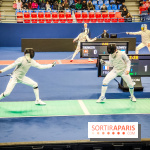It's one of the sports we always look forward to at the Olympic and Paralympic Games: thefencing events in Paris are one of the must-see events at the 2024 Olympics. Fencing has been an Olympic sport since the very first modern Olympic Games, in 1896. Do you dream of watching fencing in 2024? Then come to the Grand Palais from July 27 to August 4, 2024.
Fencing is a combat sport, also considered an art. It is one of the oldest sports in the world: representations of fencing are to be found on Egyptian tombs and among the Hittites. It's impossible to retrace the sport's rich history in detail.
In the West, fencing is first and foremost the art of wielding a weapon, and the art of self-defense. From the Middle Ages onwards, fencing became primarily useful: it was an essential apprenticeship for the military and thearistocracy. In the 19th and early 20th centuries, fencing gradually became a sport open to all.
From the very first edition of the Modern Games, in 1896, fencing was part of the festivities... But not entirely. Fencing can be practiced with three weapons: foil,épée and sabre. Only foil and sabre were initially accepted at the Olympic Games. Epee joined the competition in 1900. For women, it would be much longer before fencers could compete in the Olympic Games. Women's foil was included in 1924, women's épée in 1996 and women's sabre in 2004.
In competition, fencing is contested according to age group and weapon. Each weapon has its own rules. In foil, you can only hit with the point, and only on your opponent's torso. You must have the right of way to hit and score a point.
In epee, you also hit with the point, but the whole body is a potential target. There is no convention of priority. Finally, the sabre is an estoc weapon, where you hit with the blade. As with foil, you must have priority in order to hit and score. With sabre, you can touch the torso, arms and head.
At the Olympic Games, foil and epee matches take place over 15 touches and three three-minute periods. Sabre fencing involves eight touches in two periods. Team matches take place in relays: three fencers from the same team compete against the three opposite, with a maximum of 45 touches.
France is particularly gifted and rewarded in fencing at the Olympic Games. " Fencing is the most decorated French sport in the history of the Olympic Games, with 128 medals, including 43 titles ", says the French Fencing Federation. Fencing is one of the few sports where refereeing in international competitions is carried out in French!
However, France is not the only country to stand out in this discipline. Italy's Nedo Nadi is the only fencer to have won an Olympic medal with all three weapons: he triumphed in 1920 with épée, foil and sabre! History also remembers the name of his compatriot, Edoardo Mangiarotti, who still holds the record for the most Olympic fencing medals (6 gold, 5 silver and 2 bronze in epee and foil). In fact, Italy and France often battle it out for first place on the medal table.
French fencers have thus left their mark on the history of French sport. Roger Ducret, Philippe Cattiau and Laura Flessel are just some of the Frenchmen who have won the most medals at the Olympic Games. But the younger generation is already making waves. In 2022, the French team comprising Romain Cannone, Yannick Borel, Alex Fava and Alexandre Bardenet was crowned world champion. It's enough to give us hope for the Paris Olympics!
How about becoming a fencer yourself?
Fencing: where to learn and practice this sport in Paris and the Ile-de-France region?
Fencing is a sport we all dream about. How about learning to handle the sword, sabre or foil? Here are the clubs in the Paris region where you can learn and practice fencing. [Read more]







 Fencing: where to learn and practice this sport in Paris and the Ile-de-France region?
Fencing: where to learn and practice this sport in Paris and the Ile-de-France region?














